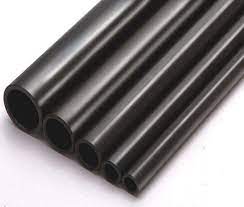The hardness of black carbon steel pipe can be affected by many different factors, including carbon exposure, the amount and type of other elements in the alloy, and the specific process used to make the steel. Mild steel contains 0.05% to 0.25% carbon and is typically the softest variety, but can be hardened through a process called carburization. Ultra-high black carbon steel pipe can be composed of up to 2% carbon and is generally the hardest type, although the final hardness of each product is also determined by various heat treatment processes. The quenching process can increase the hardness of black carbon steel pipe by about four times, although subsequent tempering usually reduces the hardness.

Black carbon steel pipe is an alloy composed primarily of iron and carbon. Other elements may also be present, usually in very small amounts. The exact makeup of black carbon steel pipe has several different definitions, although elements such as silicon and copper typically make up less than 0.6% of various alloys. Some black carbon steel pipe alloys can also contain up to 1.6% of elements such as manganese. Since there are many different alloys commonly referred to as black carbon steel pipe, each type tends to have a different hardness.
What factors affect the hardness of black carbon steel pipe?
The main factor that affects the hardness of black carbon steel pipe is the amount of carbon present in the alloy. Mild steels tend to be the softest, while ultra-high black carbon steel pipes can be very hard and brittle. The physical properties of black carbon steel pipe can also be changed through various treatments to increase or decrease hardness.
Although mild steel is relatively soft, a process called carburization causes it to become harder. This heat treatment process actually causes the alloy to absorb additional carbon from solid, liquid, and gaseous sources such as charcoal and carbon monoxide. Carbon is usually only absorbed into the surface of the metal, which results in a case-hardened outer layer and a softer ductile core.
High carbon content steels tend to be difficult to start with, but the quenching process makes them even more difficult. If a black carbon steel pipe alloy is too hard, it will often also be brittle. Some particularly hard alloys actually go through a quenching and tempering process that reduces the hardness of black carbon steel pipe and increases its ductility. Other processes, such as annealing, can also effectively increase ductility and reduce the overall hardness of the steel.
Article source: https://article-realm.com/article/Business/53368-Factors-affecting-the-hardness-of-black-carbon-steel-pipe.html
Reviews
Comments
Most Recent Articles
- Sep 14, 2024 Pursue Your Dream: A Complete Guide to MBBS in Nepal with Ria Overseas by Mbbsinblog
- Sep 14, 2024 MBBS in Moldova: A Gateway to a Successful Medical Career for Indian Aspirants by Mbbsinblog
- Sep 14, 2024 Explore Your MBBS Journey in Bulgaria: A Complete Guide by Ria Overseas by Mbbsinblog
- Sep 14, 2024 Acceptance Criteria for 304 Stainless Steel Pipes by Jane Tian
- Sep 14, 2024 Eliminate Allergens and Bacteria: Aircon Chemical Wash by coolcare
Most Viewed Articles
- 4071 hits Flexographic Printing Plates Market Size, Share, Report 2024-32 by ellyse perry
- 2458 hits Mist Sprayer Pumps Market Demands, Trends, Industry Analysis, Segmentation by 2032 by ellamrfr
- 1292 hits Plastic Bottles and Containers Market to Signify Strong Growth by 2024-2031 by mansi jain
- 797 hits Thin Wall Packaging Market to Witness Growth Acceleration by 2029 by faraz pathan
- 735 hits Air Traffic Control Equipment Market to Witness Robust Expansion by 2029 by faraz pathan
Popular Articles
In today’s competitive world, one must be knowledgeable about the latest online business that works effectively through seo services....
77367 Views
Are you caught in between seo companies introduced by a friend, researched by you, or advertised by a particular site? If that is the...
32685 Views

Walmart is being sued by a customer alleging racial discrimination. The customer who has filed a lawsuit against the retailer claims that it...
13702 Views
If you have an idea for a new product, you can start by performing a patent search. This will help you decide whether your idea could become the...
11084 Views
Statistics
| Members | |
|---|---|
| Members: | 15316 |
| Publishing | |
|---|---|
| Articles: | 63,054 |
| Categories: | 202 |
| Online | |
|---|---|
| Active Users: | 581 |
| Members: | 14 |
| Guests: | 567 |
| Bots: | 5820 |
| Visits last 24h (live): | 2244 |
| Visits last 24h (bots): | 23419 |




